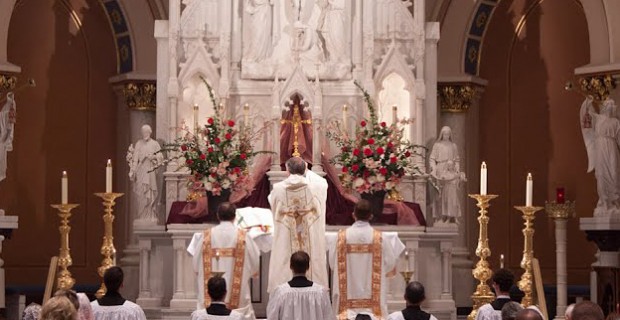
Gold chalices and patens. Marble altars and floors. Gold tabernacles and vestments. Marble columns and steps. Gold candle and lamp stands. Marble rails, linen cloths, beeswax candles, rare incenses, professional choirs, elaborate stained windows, Sunday-best outfits, heirloom Missals, crystal holy water fonts, intricate murals and icons… oh my! All the money spent on these superficial things could have been sold, and the money given to the poor.
The Catholic Church is so hypocritical.
According to Judas.
How do we know this is what Judas would say to the Church today? Because it’s in the Gospel of John (12:3-8):
And now Mary brought in a pound of pure spikenard ointment, which was very precious, and poured it over Jesus’ feet, wiping his feet with her hair; the whole house was scented with the ointment. One of his disciples, the same Judas Iscariot who was to betray him, said when he saw it, “Why should not this ointment have been sold? It would have fetched three hundred silver pieces, and alms might have been given to the poor.” He said this, not from any concern for the poor, but because he was a thief; he kept the common purse, and took what was put into it. And Jesus said, “Let her alone; enough that she should keep it for the day when my body is prepared for burial. You have the poor among you always; I am not always among you.”
If it’s not obvious, here’s the breakdown:
- The Gospels teaches here that reverencing and honoring our Lord is first before all else. He is our top priority because His sacrifice shows how precious we are to Him. In return, we show how precious He is to us.
- If we neglect Jesus, if we neglect Love incarnate, then love will always be distorted in our pathetic mortal lives. God is love; He’s the origin of love and created us out of love. If we dismiss Love, then whatever we have left ain’t love.
- If we really want to care for the poor, then we must bring Jesus to them. Who are the true poor? Those who don’t know the true King. Everything we have: health, smarts, wealth, arts: all belong to Him. He is the Creator of all. The least we can do is consecrate our best to Him, so He can make more miracles out of them.
- Remember: only God can multiply food, multiply the years of our lives, multiply the hours in our days, and the resources we have. If we really care for the poor, then Jesus is our greatest resource. And guess what: He loves the poor more than we do. Loves them so much that He died for them (which means we’re also part of the “poor”).
- And what about those who give God only leftovers, mediocre efforts, lazy and lackluster work? Well, I think Jesus’ words apply also: “I am not always among you.” So let’s get back to Him before it’s too late! Give Jesus the gold, the marble, the linens and beeswax and incense, and crystals!
This is why we must make our churches beautiful again. Banish the tacky carpets, felt banners, cartoonish pictures, goofy crucifixes, lame altars, cheap chalices, dollar-store vestments, last-minute linens (crooked, wrinkled, and SMH), cringeworthy music, eyerolling projectors, inappropriate clothes, mad-lib prayers, disposable Missals, and the puppets….

After all, even Pope Francis’ latest document: Traditionis Custodes, was accompanied by his letter that states: be vigilant in ensuring that every liturgy be celebrated with decorum and fidelity to the liturgical books promulgated after Vatican Council II, without the eccentricities that can easily degenerate into abuses.
So let’s make EVERY Mass as reverent and traditional as possible. Please banish the cringe and the clowns.

